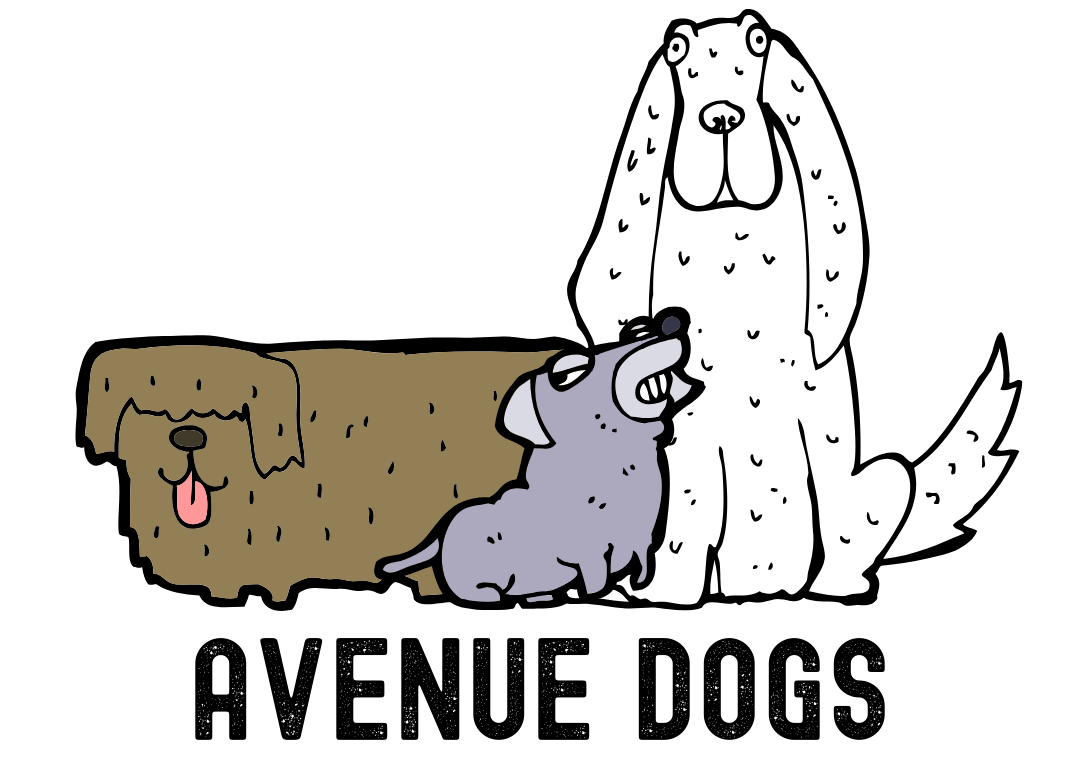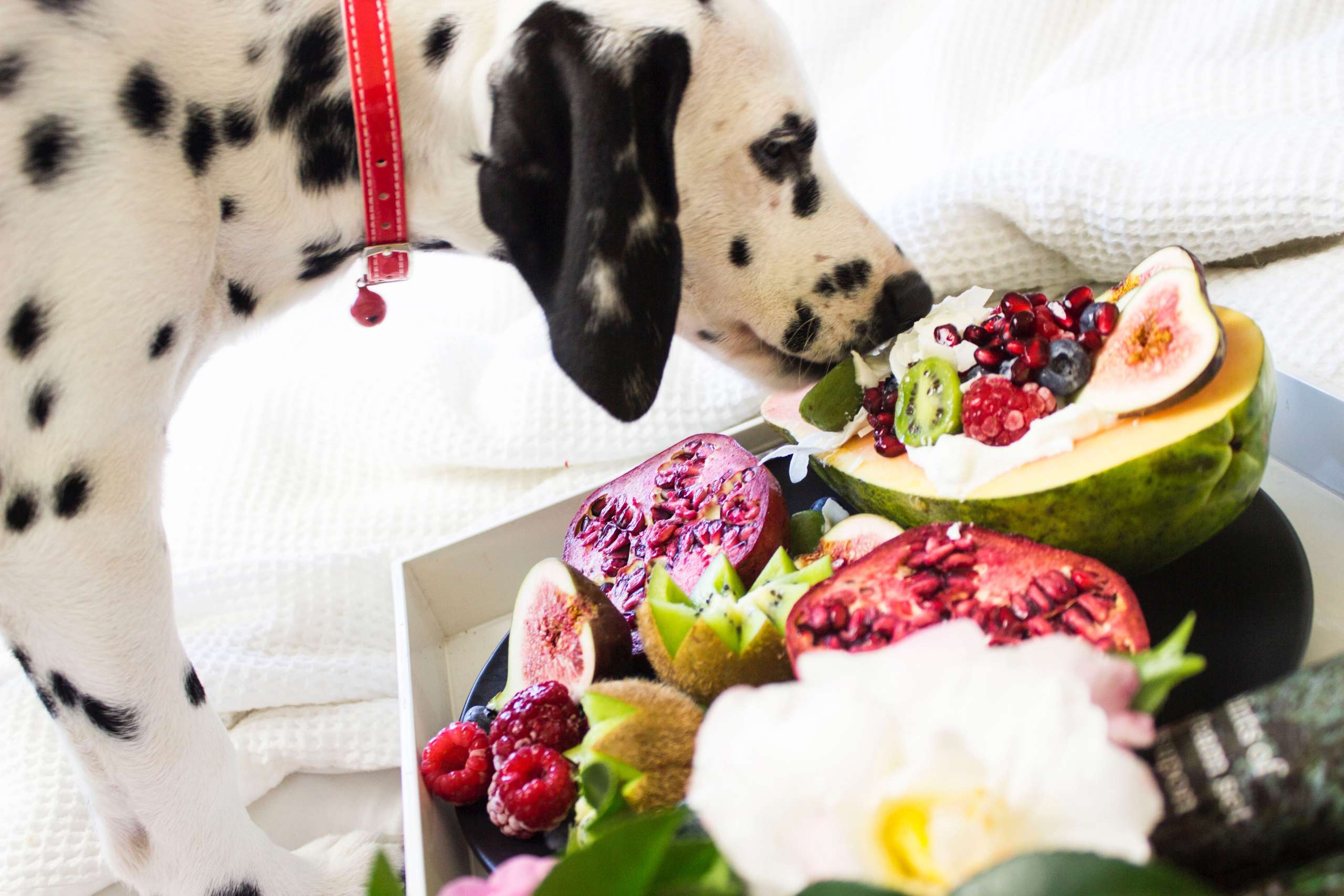


Large dog breeds often have very unique nutritional needs. If you’ve been thinking about switching from commercial dog food to wholesome homemade dog food for your pet, you’re not alone. More and more people are making the change to feeding their dogs a more healthy, natural diet.
Commercial dog food for large dog breeds is usually formulated to be nutritionally balanced for their unique needs. Homemade dog food recipes on the internet, however, seem to take a one-size-fits-all approach. Unfortunately, not all of these recipes are nutritionally balanced for large breed dogs and large breed puppies. Some of them aren’t even nutritionally balanced for canines at all.
This article is intended to be a reference point so that when you find an online recipe you’d like to try out, you can determine if its ingredients are beneficial for your large breed dog. In addition, there are sections below detailing the best ingredients for special needs dogs (picky eaters, overweight dogs, or dogs with certain ailments).
If you’ve come here looking for a wholesome homemade dog food recipe, click that link for the one-pot-meal recipe we make for our own large breed dogs.
The Do’s & Don’ts of Making Homemade Dog Food for Large Dogs



While each dog owner’s homemade dog food may vary in ingredients and additives, there are a few rules that wholesome homemade dog food should follow. There are also a few ingredients you should absolutely avoid when testing homemade dog food ingredients. Let’s take a look…
Key Ingredients to Look for in Dog Food Recipes
While your pup’s nutritional needs will most certainly change many times over the course of their life, a balanced, wholesome homemade dog food recipe for large dogs should include:
- Vitamins – K, A, B, C, D, and E, which can be found in most of the ingredients below
- Calcium – derived from bone-meal, yogurt, or eggs
- Fat – derived from meat or vegetable
- Protein – usually in the form of beef, chicken, or eggs
- Fatty Acids – from oatmeal or canned fish
- Minerals – such as iron, magnesium, calcium, and zinc derived from bone meal, beans, and vegetables
- Carbohydrates – usually from the rice or grains used as filler
The best part of making your own dog food is that you can use a variety of different ingredients to cater specifically to your dog’s needs and preferences.
What are the Best Fillers for Homemade Dog Food?
In addition to rice, some great fillers include beans, sweet potatoes, beet pulp, vegetables, barley, and potatoes.
What Foods Should you Avoid Feeding your Dogs?
When preparing all-natural, wholesome homemade dog food, the following foods should be avoided as they can lead to illness:
- Tree nuts (such as walnuts, almonds, macadamia, etc)
- Chocolate
- Grapes
- Raisins
- Avocado
- Onions
- Garlic
- Shallots
- Mushrooms
- Xylitol (this is a popular sugar substitute that can be found in some peanut butters, yogurts, or processed foods. Dogs should avoid xylitol at all costs.)
Your dog may have more specific allergies, which should also be considered. The ASPCA has a comprehensive list of foods you should avoid feeding your dog, but you can always ask your vet.
How Much Food Should You Feed Your Large Dog?
Whether it’s commercial dog food or homemade, the goal is to provide large dogs, weighing between 60-100 pounds, with around 3-4 cups of homemade dog food per day (preferably split between a morning and an afternoon feeding).
Wholesome Homemade Dog Food Ingredients for Specific Ailments
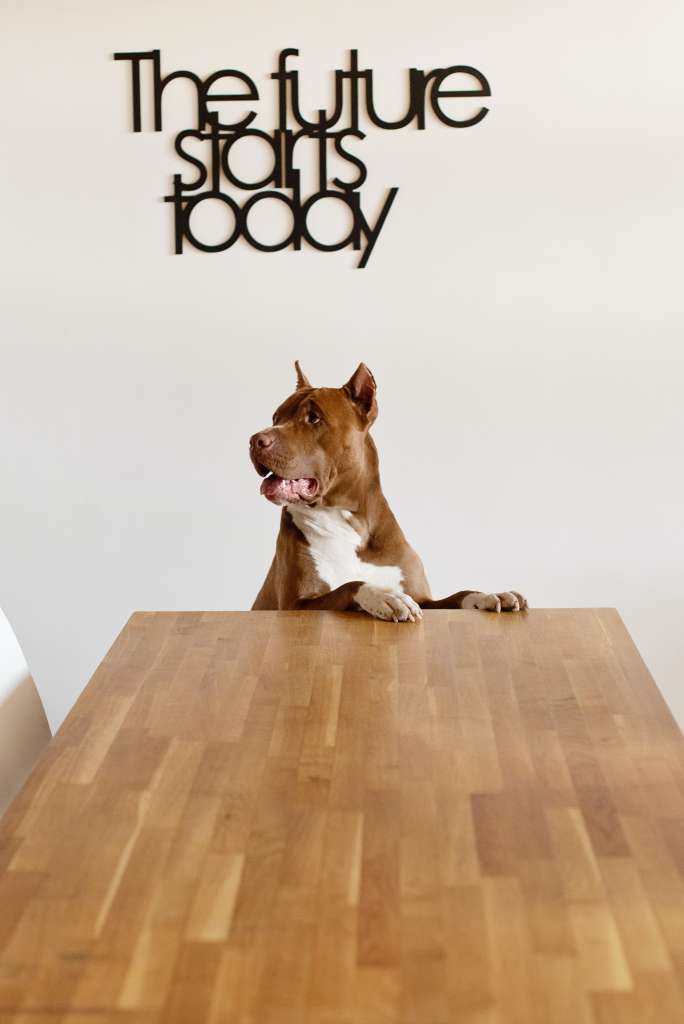


In addition to the do’s and don’ts above, your dog may require a special diet based on its special needs. Below let’s check out some common ailments in dogs and homemade dog food ingredients that you should and shouldn’t be incorporating into your pup’s diet.
Dog Food Ingredients for Dogs with Struvite Bladder Stones
Struvite bladder stones are normally caused by a urinary tract or bladder infection and are quite different than normal bladder stones in dogs (which we cover below). Dogs with struvite bladder stones will require a special diet that should be followed both while the stones are active, and after they’re gone to ensure they don’t form again.
Let’s check out some wholesome homemade dog food ingredients to feed your pup with struvite bladder stones, and some ingredients to avoid.
Ingredients to Add for Dogs with Struvite Bladder Stones
- Plain cooked chicken (white or dark meat is ok)
- Plain cooked turkey (white or dark meat is ok)
- Scrambled Eggs
- White rice
- Blueberries
- Chicken fat
- Corn
- Raw fruits (except tomatoes)
- Raw or cooked vegetables (except as listed below)
- Sugar-free, unflavored yogurt
- Chicken Stock (to up liquid consumption)
Ingredients to Avoid for Dogs with Struvite Bladder Stones
- Spinach
- Sweet potatoes
- Organ meat
- Brown rice
- Asparagus
- Raw carrots
- Tomatoes
- Dairy products (except sugar-free, unflavored yogurt)
Dog Food Ingredients for Dogs with Regular Bladder Stones
While struvite bladder stones are caused by an infection, regular bladder stones in dogs can be caused by a number of factors, including diets high in minerals (especially calcium), water with high mineral content, bladder disease, or even a slow metabolism.
If your dog has, or is prone to, regular bladder stones, here are some foods to consider adding to their homemade dog food, as well as some you should avoid.
Ingredients to Add for Dogs with Regular Bladder Stones
- Pumpkin seeds
- Peeled apples (raw or cooked)
- White rice
- Lean meats (like chicken or turkey breast)
- Poached white fish (cod, tilapia, white bass, etc)
- Chicken stock
- LOTS of water
Ingredients to Avoid for Dogs with Regular Bladder Stones
- Spinach
- Asparagus
- Tomatoes
- Dairy
- Sweet potatoes
- Organ meat
- Brown rice
Dog Food Ingredients for Dogs with Liver Disease
Liver disease in dogs is very serious and requires not just a change in diet, but an immediate trip to the veterinarian. Typical warning signs of liver disease in dogs include more frequent urination, loss of appetite, severe weight loss, chronic diarrhea, and\or chronic vomiting.
In addition to changing your dog’s diet, dogs with liver disease should also change their eating habits. Instead of feeding them their daily food twice a day, try to split up their feedings into 4-5 smaller meals a day in order to allow the liver time to properly process the food.
Ingredients to Add for Dogs with Liver Disease
- Eggs
- Canned pumpkin (unsweetened and not pumpkin pie filling)
- Chicken or turkey breast (poached)
- Cottage cheese
- Canned sardines
- Fish oil
- Poached white fish (cod, tilapia, white bass, etc)
- Oatmeal (unsweetened)
- Peanut butter (unsweetened)
- Peeled Papaya
- Coconut oil
- Cheese
- Watermelon
- Yogurt (plain & unsweetened)
Ingredients to Avoid for Dogs with Liver Disease
- Beef
- Pork
- Lamb
- Organ meat
- Duck
- Tuna (canned or fresh)
- Salmon (canned or fresh)
- Xylitol (this ingredient is a no-no for any dog, but it can be particularly bad for dogs with liver disease)
Dog Food Ingredients for Dogs with Skin Allergies
Skin allergies in dogs can be caused by a number of things, including diet, environment, stress, or thyroid disease. Skin allergies are usually easy to spot, and symptoms include hair loss; red skin; gnawing, scratching, or biting affected areas; excessive licking; excessive rubbing against surfaces.
If your dog is suffering from skin allergies, a change in diet can be beneficial. Let’s check out some of the good and bad foods for your pup who’s suffering from skin allergies.
Ingredients to Add for Dogs with Skin Allergies
- Yogurt (unflavored & unsweetened)
- Kale
- Spinach
- Carrots
- Green Beans
- Broccoli
- Beets
- Celery
- Cucumber
- Canned fish
- Brown rice
Ingredients to Avoid for Dogs with Skin Allergies
- Gluten
- Grains
- Eggs
- Soy
- Dairy (except unflavored, unsweetened yogurt)
- Beef
- Chicken
- Lamb
Dog Food Ingredients for Dogs with Yeast Infections
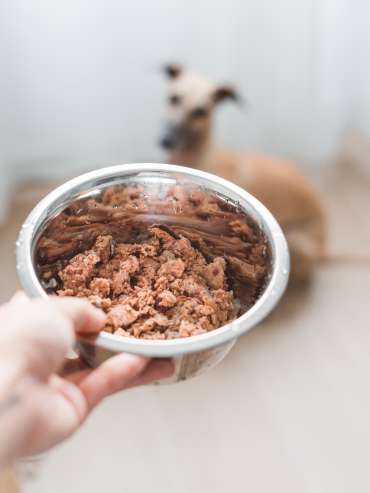


A yeast infection might be mistaken for a simple skin allergy on your dog. The difference…the smell. Yeast infections, once they reach a certain point, begin to stink, a lot. Other symptoms of a yeast infection might be greasy, scaly, or oily skin; excessive licking, rubbing, or scratching at the infection site; and\or swollen, red, or warm skin at the infection site.
There are numerous reasons your dog might get a yeast infection, including flea or pest bites; molds or funguses; an allergic reaction to something in the dog’s environment; or even the food that your dog is eating.
Let’s take a look at some wholesome homemade dog food ingredients you can incorporate into your pet’s food if they currently have a yeast infection, or if they’re prone to them. We’ll also check out some foods that could cause, or exasperate, a yeast infection.
Ingredients to Add for Dogs with Yeast Infections
- Coconut oil
- Garlic
- Vegetables (especially broccoli, cauliflower, collard greens, or bok choi (raw or cooked))
- Ginger
- Apple Cider Vinegar
- Fresh salmon or trout (poached or steamed)
- Yogurt (unflavored & unsweetened)
- Canned fish (except tuna)
Ingredients to Avoid for Dogs with Yeast Infections
- Carbs (you’re going to want to severely limit the amount of carbs your dog consumes during a yeast infection. This includes potatoes, rice, and oats)
- Sugar (it’s always a bad idea to feed your dog sugars, especially so during a yeast infection)
- Yeast (believe it or not yeast can cause a yeast infection, or make one worse. Stay clear of all baked goods like bread and pizza crusts)
- Peas
- Corn
- Wheat
Wholesome Homemade Dog Food Ingredients for Weight Loss
Is your furry family member getting a little pudgy around the mid-section? It happens to the best of us. While you might think your newly-pudgy pup is still a cutie, that extra weight can be a serious health risk. Overweight dogs are more prone to arthritis, heart disease, joint deterioration, cancer, and premature death.
Switching from a commercial dog food to a wholesome homemade dog food lower in calories is a good way to help your dog shed those unwanted pounds. Combine the new diet with a couple of long walks a day, and your 4-legged buddy will be back in shape in no time. Let’s check out some homemade dog food ingredients to add to your dog’s diet, and some foods to stay away from.
Ingredients to Add for Weight Loss
- Chicken or turkey breast (poached or boiled)
- Veggies (the American Kennel Club has an extensive list of veggies that dogs can eat)
- Fresh white fish (steamed or poached)
- Brown rice
- Yogurt (unflavored and unsweetened)
- Cottage cheese (low fat)
- Greens (collards, spinach, kale, or arugula (raw or steamed)
Ingredients to Avoid for Weight Loss
- All processed foods
- All “people food” (leftover pizza, table scraps, etc)
- Beef
- White rice
- Potatoes
- Peanut butter
- Lamb
Dog Food Ingredients for Dogs with Pancreatitis
Pancreatitis in dogs is a potentially life-threatening ailment if left untreated. Your dog could be at risk of developing pancreatitis if it’s fed a diet of high-fat foods, eats lots of table scraps, or if your dog is a chronic “scrounger” (will eat anything and everything if finds, including garbage).
Symptoms of pancreatitis include loss of appetite, diarrhea, vomiting, high fever, bloating and abdominal pain, or weird posture (such as hunching their back or having their front forearms on the ground while their rear end is in the air).
The best way to protect your dog from pancreatitis is to feed it a healthy, low-fat diet. Let’s take a look at some of the ingredients you can incorporate into your pup’s diet, and some you should avoid.
Ingredients to Add for Dogs with Pancreatitis
- Chicken or turkey breast (poached or boiled)
- Scrambled egg whites
- Boiled potatoes
- Brown rice
- Veggies (cucumbers, carrots, broccoli, green beans, etc)
- Barley
- Yogurt (unflavored and unsweetened)
- Bananas
Ingredients to Avoid for Dogs with Pancreatitis
- Bonemeal
- Beef
- Lamb
- Game meat
- Dairy (aside from egg whites and plain yogurt)
- Peanut butter
- Egg yolks
- Table scraps
Wholesome Homemade Dog Food Ingredients for Dogs with Sensitive Stomachs
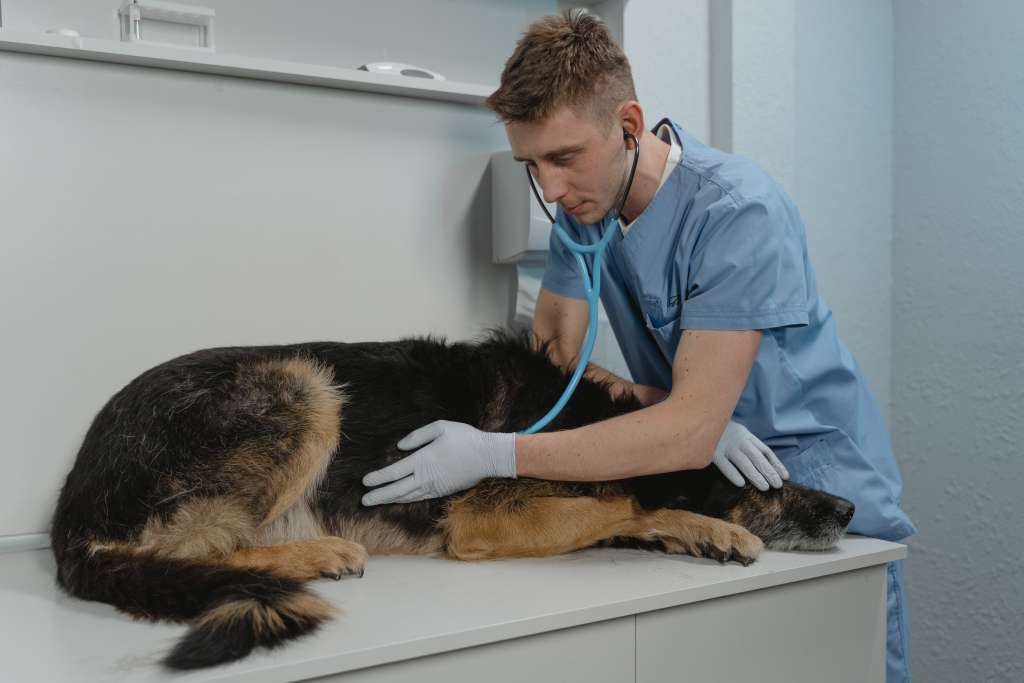


Dogs with sensitive stomach don’t really react well to commercial dog foods. If you’re noticing your dog’s poo is soft more often than not, or they’re vomiting, have a decreased appetite, or their gas is more intolerable than normal, you may want to think about making your own dog food.
Unfortunately, finding out what ingredients to incorporate into your homemade dog food for dogs with a sensitive stomach could be a process of trial and error. Some dogs react to certain foods differently. While your best friend’s pup may love a diet heavy in red meat, your little guy’s belly might not be able to handle it.
When switching from commercial dog food to homemade, start in small batches. It should be apparent pretty quickly what foods your dog is tolerating well, and what they’re not. Even though different dogs react to foods differently, the following list should be a good place to start when choosing which ingredients to add or avoid in your homemade dog food.
Ingredients to Add for Dogs with Sensitive Stomachs
- Chicken or turkey breast (poached or boiled)
- Canned or boiled pumpkin (not pumpkin pie filling, please)
- White fish (steamed or poached)
- Sweet or regular potato (boiled and mashed)
- White or brown rice
- Veggies (steamed or boiled)
- Barley
- Scrambled eggs
- Yogurt (unflavored and unsweetened)
Ingredients to Avoid for Dogs with Sensitive Stomachs
- Dairy (except scrambled eggs and yogurt)
- Beef
- Lamb
- Game meat
- Raw fruits or veggies
- Table scraps
Dog Food Ingredients for Dogs with Kidney Disease
There are numerous reasons your dog might be suffering from kidney disease: bacterial infections, allergies to toxins in the house, internal damage from blunt force, or even genetics. While your pup’s diet may not be the cause of kidney disease, there are certain ingredients in your homemade dog food that could exasperate the problem.
If your dog has been diagnosed with kidney disease, let’s take a look at a few ingredients you should be incorporating into your wholesome homemade dog food, and a few you should absolutely avoid.
Ingredients to Add for Dogs with Kidney Disease
- Canned fish in oil (sardines, anchovies, herring, etc (not tuna, though))
- Flaxseed
- Veggies (especially bell peppers, green beans, carrots, zucchini, broccoli (raw or cooked))
- Fruit (watermelon, apples, blueberries, bananas (raw or cooked))
- Chicken or turkey breast (boiled or poached)
- Scrambled egg whites
- Sweet or regular potatoes (boiled and mashed)
- Chicken stock
- LOTS of water
Ingredients to Avoid for Dogs with Kidney Disease
- Beef
- Lamb
- Game meat
- Organ meat
- Egg yolks
- Dairy
- Legumes (beans, peas, lentils, etc)
- Whole bones or bone meal
Wholesome Homemade Dog Food Ingredients for Picky Eaters



Whether it’s children or pets, picky eaters can be a handful. At least a child can explain to you why they don’t like a food, whether it’s the taste, smell, or texture. A dog who’s a picky eater will just turn their nose up at its food bowl, without giving you even a little hint as to why.
Trying to move your picky eater from commercial dog food to a more nutritious homemade dog food can be a struggle. Our suggestion is before making a whole batch of dog food, and hoping they like it, start off small. Offer your pooch the specific ingredients in small doses, in between meals, to see if they like the ingredient. After a little trial and error, you should find a list of ingredients your picky-eater will tolerate
Below is a list of ingredients that most dogs find palatable, and it’s a good place to start. Following that are some ingredients that most picky eating dogs tend to turn their nose up at, or shouldn’t even be eating in the first place.
Ingredients to Add for Picky Eaters
- Canned or boiled pumpkin (not pumpkin pie filling)
- Chicken or turkey breast (poached or boiled)
- Steamed veggies
- Scrambled eggs
- Brown or white rice
- Fresh or cooked fruits (bananas, apples, blueberries cantaloupe, etc (not grapes))
- Peanut butter
- Yogurt (unflavored and unsweetened)
Ingredients to Avoid for Picky Eaters
- Organ meat
- Wheat
- Grapes or raisins
- Tomatoes
- Dairy (except eggs and yogurt)
- Avocados
- Cherries
- Asparagus
- Mushrooms
- Onions
Your Dog’s Unique Nutritional Needs
Your dog’s nutritional needs will vary based on their weight, age, breed, activity level, and overall health condition. If you plan on changing your dog’s diet, speak with your veterinarian or a canine nutritionist to be sure your furry friend’s specific nutritional needs are addressed.
Although you certainly can do your own research, consulting with your vet or a canine nutritionist can save you a lot of time and ensure your dog’s specific needs are met.
Is it Time to Make the Switch to Wholesome Homemade Dog Food?



Homemade dog food may seem like a lot of work, but the benefits of having a healthier, happier dog are worth it. Whether you make wholesome homemade dog food their primary food source, serve it intermittently throughout the week, or mix it in with their normal kibble diet, making nutritious food is a great way to show your dog how much you love them.
Emily is a writer who travels full-time in a converted school bus (aka skoolie) with her 5 year old lab mix, Eliot. She is passionate about sustainability and making healthy lifestyle changes. Emily enjoys hiking and exploring the country with Eliot.
